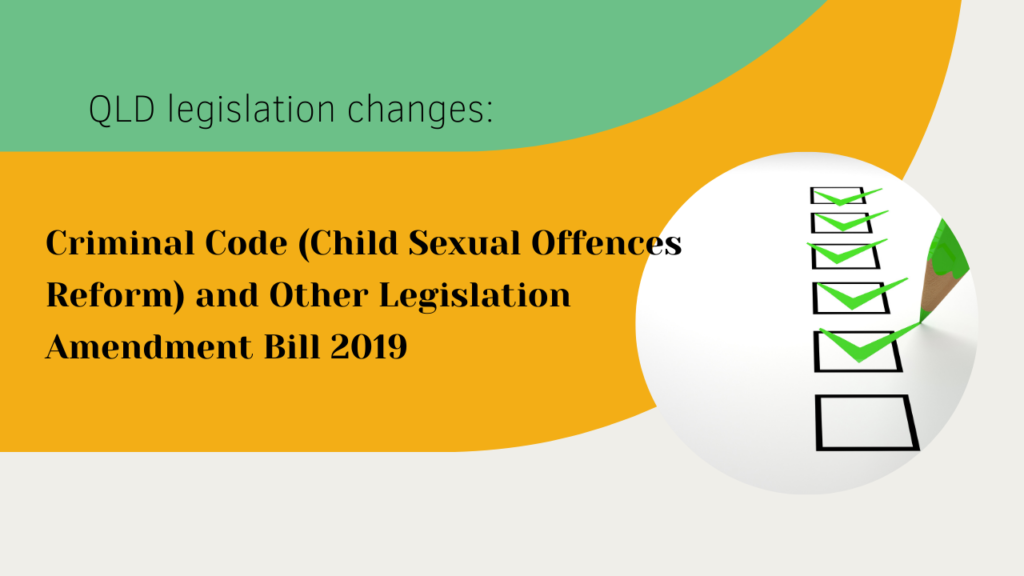
Child Sexual Offence Reform QLD
Do your policies, processes, and training evidence the requirements and empower your people to not commit an offence under the new legislation?
Failure to protect children in an institution will be a criminal offence in QLD once these new sections are enacted in the Criminal Code Act 1899 (QLD).
This is a fabulous outcome for children. Let’s get it right.
We will consider the implications of two of the changes. This information is provided as a broad overview and is not legal advice. The parts have been broken into bullet points to show the elements as this helps to understand the legislation.
1 – s.229BB Failure to protect child from child sexual offence
The key work here is PROTECT. This is targeting grooming and other events resulting in child sexual abuse within an institution. It focuses on internal processes to reduce or remove the risk of child sexual abuse within an institution.
This is not all of the requirement but provides some of the key elements.
These changes apply to institutions providing services, programs or activities to children such as schools, church groups, early learning centres, sporting groups, clubs etc.
Who is required to act?
- Anyone ‘associated’ with the institution may be the accountable person.
- The legislation applies to owners, managers, employees, volunteers, or a person involved in activities at the institution which requires them to hold a Blue Card.
A child or young person (in this piece of the legislation) is
- under 16 years or with an impairment of the mind and
- is in the care, supervision or control of an institution.
The alleged offender is
- associated with the institution
When is an offence committed?
- where the accountable person has the power and responsibility to reduce or remove the risk and
- when that accountable person becomes aware that an adult will commit a child sexual offence, within an institution, and
- that person wilfully and negligently fails to do so.
It is irrelevant if this accountable person becomes aware during or in connection with a religious confession.
Penalty – maximum 5 years imprisonment for the person who failed to act.
2 – s.229BC Failure to report belief of child sexual offence committed in relation to child
This is a broad community obligation to report child sexual abuse. It removes the ‘within the organisation’ limitation that other pieces of legislation required (EGPA).
Who – every adult.
A child or young person (in this piece of the legislation) is
- under 16 years or with an impairment of the mind and
- is in the care, supervision or control of an institution.
When is an offence committed?
- When the adult gains information that
- causes them to believe on reasonable grounds, or
- ought reasonably to cause the adult to believe,
- that a child sexual offence
- is being or has been committed (still happening or has happened in the past)
- against a child by an adult. AND
- The adult fails to inform police as soon as practicable.
It is irrelevant if this person becomes aware during or in connection with a religious confession.
There are some exceptions in the legislation including where an adult victim discloses previous child sexual abuse and does not want to have this information reported. No such protection is provided if an adult makes a disclosure of having previously offended against a child or young person.
Penalty – maximum 3 years imprisonment for not reporting to police.
An individual who reports to police, in good faith, are protected from civil, criminal and administrative penalty.
What does this mean for your organisation?
Check that your policies and processes reflect the requirements –
- Code of Conduct
- Student/child protection/wellness
- Child and Youth Risk Management Strategy
- Volunteer Code of Conduct and agreements
- Homestay family Code of Conduct and agreements
- Boarding School/International School Code of Conduct and agreements
Update training to reflect the requirements for next year –
- Annual employee child/student protection training – reporting child sexual abuse and recognising grooming behaviours.
- Induction of new employees and volunteers – reporting child sexual abuse and recognising grooming behaviours.
- Homestay family induction and training – reporting child sexual abuse and recognising grooming behaviours.
Annual review of the Child and Youth Risk Management Strategy. Include a situational awareness element to identify environmental concerns such as line of sight, boundaries, and lighting and other risks including transporting and billeting. Homestay programs
We can help with all of these. Use the contact page to get in touch. Email yvette@sochildren.com or complete the contact form. We’re here to help.